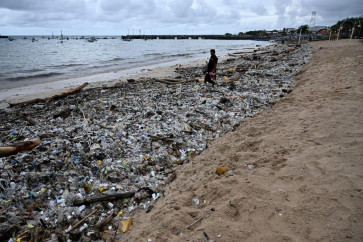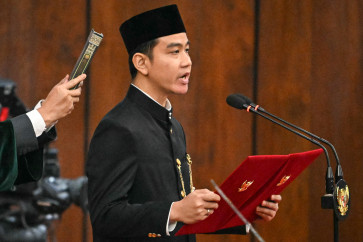From reformation to deformation? 25 years of backsliding
The rule of law in Indonesia has become “rule through law”, meaning “the ruling elites ensure that the law, the courts and law enforcement institutions side with the powerful".
Change text size
Gift Premium Articles
to Anyone

M
y current pet peeve is the recent trend of people saying, “Siap!”, which literally means “Ready!” but in Indonesia is how military subordinates respond when their superior officer gives them a command. In English it would be “Yes sir!”, while clicking one’s heels and giving a military salute, raising the arm and touching the side of the forehead or cap with the tip of the forefinger.
Lately, all and sundry – young and old, women and men, activists, intellectuals, lay people, Muslims and non-Muslims – say “siap”, when in the past they would have said “oke” (okay), “baik” (fine), or “sip”, which possibly derives from the English word “safe”, meaning “all clear”, “for sure”, “guaranteed” or “very nice”, depending on the context. “Oke”, “baik” and “sip” are just as short and snappy as “siap”, so I am not sure why people started to pick it up. Is militarism secretly embedded in our collective unconscious?
This trend irritates me, as I associate it with the New Order military authoritarian regime. It lasted from 1966 to 1998, which means I spent 32 years of my life, from age 12 to 44 in it. The adult part of these 32 years were spent fighting it, mainly through my writings, which were critical of the regime. Risky business that, as in the New Order, dissidents could be blacklisted, taken in, interrogated or even “disappeared”.
May 21, 1998, was when president Soeharto stepped down, supposedly marking the end of the New Order regime that he led and the beginning of the Reform Era, making this year the 25th anniversary of the start of Reformasi, as we refer to it in Indonesian.
As someone who not only witnessed but was deeply involved in activism and demonstrations against the Soeharto regime and also documented the events, I have a very personal and intimate connection to the birth of this period. I decided to reread some of the chapters in my 2004 book, Sex, Power and Nation (Metafor, 2004), which contains 20 pieces written between 1979 and 2003, mainly during the New Order era.
Chapter 1, “Bananas, Backstabbing and Anarchy”, originally titled “Reform or Revolution: The end of the Soeharto Era”, was published in This is Yomiuri, in June 1998. It recounted the days of horrifically violent anarchy, looting, mass rapes and destruction that occurred at the end of the New Order regime, with students storming the House of Representatives building. It was a politically untenable situation that culminated in President Soeharto stepping down after 32 years in power.
Chapter 13, “The Mass Rapes of May” is about the mass rape of ethnic Chinese women, targeted as proxies for the Chinese crony conglomerates of the Soeharto family, who together amassed an incredible amount of wealth during the New Order.
In many instances, the New Order’s abuse of power resulted in unspeakable suffering, reflected in the title of chapter 14, “Bayonetting the Vagina”, about military violence against women, specifically in the military operation zones (DOM) of Aceh from 1990-1998.
In that chapter, I also wrote about the pervasiveness of violence against women (VAW) in general, as well as the violence and authoritarianism of the New Order’s developmentalism, the militarization of Indonesian society and VAW as a reflection of the ills of Indonesian society. How can a nation be considered healthy if VAW is seen as normal?
And of course, the gender ideology in the New Order was that of state “ibu-ism”, state motherhood, which defined women as appendages of their husbands. With the rise of Islamic conservatism in the Reform Era, this became Islamic ibu-ism, whereby women were defined and controlled by dogmatic interpretations of Islam.
Personally, reflecting on the past is painful, as I remember vividly how I made my family – my parents, my husband and my son – suffer due to my political activism. After my episode with the state intelligence coordinating agency (BAKIN), a precursor to the current State Intelligence Agency (BIN), my family was extremely concerned, as the agency had called my mother and told her that if I was too critical, there would be consequences.
Twenty-five years later, what has changed and what have we achieved?
If the Reform Era was expected to usher in democracy, how come over the past few years analysts have been constantly commenting on democratic decline? In their article, “Indonesia’s New Despotism” (Melbourne Asia Review, 2021), Airlangga Pribadi Kusman and Milda Istiqomah asserted, “The new despotism is characterized by wealth, and the expansion of executive powers by controlling the judiciary and undermining the rule of law, despite continued elections and the retention of constitutional protections related to the separation of political and judicial power and the law. In short, it’s a way of defending the oligarchic concentration of wealth and power while maintaining public support […].”
What about human rights? In an interview on BBC in February 2020, President Joko “Jokowi” Widodo made his position very clear: His priority was the economy, not human rights or the environment. Shades of Soeharto’s developmentalism!
With regard to women’s and minority rights, patriarchy and VAW persist. Jokowi also seems to see the Women’s Empowerment and Child Protection Ministry as primarily economic, with the family and women cast as agents of development. So the “women and development” approach of Soeharto’s New Order lives on.
The lesbian, gay, bisexual, transgender and queer (LGBTQ) community has fared even worse nationally, with state-led homophobia and the mayors of Medan and Bogor declaring their cities anti-LGBTQ.
With regard to the law, it tends to be tajam ke bawah, tumpul ke atas (harsh for ordinary people and lenient for the elite). The rule of law in Indonesia has become “rule through law”, meaning the ruling elites ensure that the law, the courts and law enforcement institutions side with the powerful. Bivitri Susanti, a constitutional law scholar, published an article “Otoritarianisme Berbungkus Hukum” (Authoritarianism Cloaked in Law) in Kompas on Jan. 5, asserting that the authorities abused their power to make profit through the instruments of law.
Corruption remains rampant, and the tradition of political dynasties lives on – from Soeharto and Indonesia’s sixth president Susilo Bambang Yudhoyono to Jokowi, with his son Gibran Rakabuming Raka becoming mayor of Surakarta and his son-in-law Bobby Nasution becoming mayor of Medan. For details, read the e-book Dinasti Politik Jokowi (Tirto.id and the Kurawal Foundation, 2020).
Despite the democratic decline, Jokowi’s approval rating remains high, possibly the highest in the world, between 70 and 80 percent. Despite Soeharto’s corrupt and brutal legacy, ordinary people felt they prospered under his rule. Is this one of the reasons Jokowi is now sometimes referred to as “Little Soeharto”? The one thing that has changed is that the conglomerates have been replaced by oligarchs. Hah!
The level of democracy does not move in lockstep with the level of public satisfaction. Most people simply want their basic needs met. Is democracy, then, just a middle-class illusion and our sacrifices at the beginning of the Reform Era for naught? Is the New Order militaristic mentality so deeply embedded in our collective subconscious that we are resistant to change and forever “siap” to follow our leaders and the dictates of the ruling elite?
If this is the case, then perhaps now is the right time to change the name of Indonesia’s reformation to deformation.
***
The writer is the author of Sex, Power and Nation.









